Yes Glasses: Seeing Better AND Looking Better

Yesglasses leveraged data from previous features to build a facial recognition software to match user face types to the right frames
As a wearer of glasses since the age of 12, I have been through – like most other bespectacled folks – long and tiring cycles of choosing the “right” frame for my face. Most of it my decisions were fuelled by the wisdom of my companions at the eyeglasses store or sorting online through frames – which was both, time-consuming and erratic.
According to The Vision Council, 164 million American adults wear glasses. Further, the number of people affected by nearsightedness is projected to increase from 1.4B to 5B by 2050.
In this growing market, data is poised to generate significant value. Yesglasses is an online eyewear company selling prescription and non-prescription glasses. However, the American $13.11B eyeglasses industry is largely fragmented – with players across the US, led by Vision Source at $2,587.8M of sales in 2020. In such a market, Yesglasses could acquire a competitive advantage through its trademark facial recognition software, launched in February 2022.
How it Works
Rooted in the idea that different types of eyeglasses suit different faces (based on jaw shape, forehead size, cheekbones, overall face width, etc.) – the Yesglasses facial recognition software requires the user to upload a picture of their face, analyses it using its software, and generates results. The results include face type out of the 9 archetypes, frames that would suit your face, and frames to avoid. Further, you can also make a face poll wherein people can publicly vote on the shape of your face (to validate/invalidate the results), take a quiz to determine your face type, and displays a list of celebrities with the same face type – possibly for style inspiration.
Behind the scenes, as per the Yesglasses website, “the Face Shape Recognition software utilizes data submitted by users to determine their closest face shape according to our predetermined algorithms. We believe that as our algorithm improves and the program’s automatic learning time increases, its results will be more and more recognized by everyone. The accuracy of the recognition is also restricted by other factors.”
User Journey (in pictures)
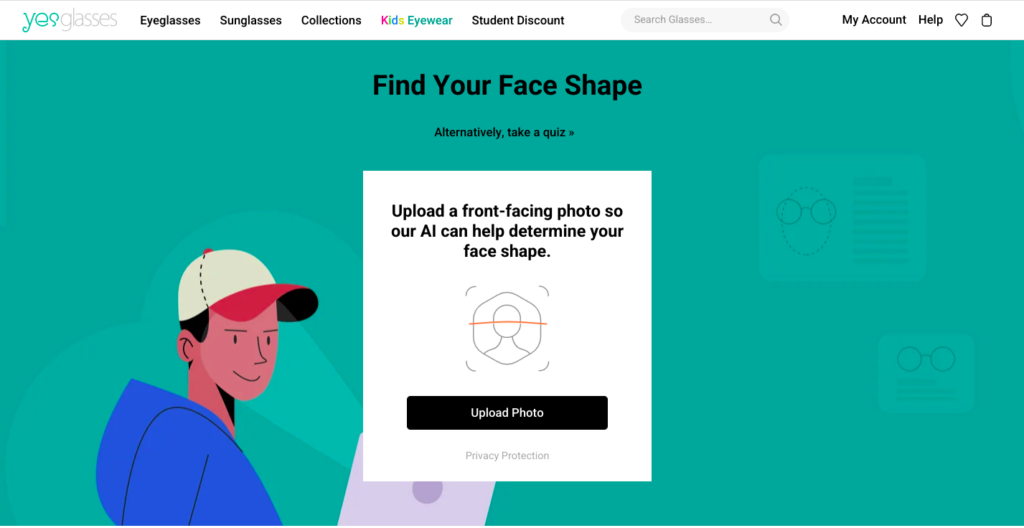
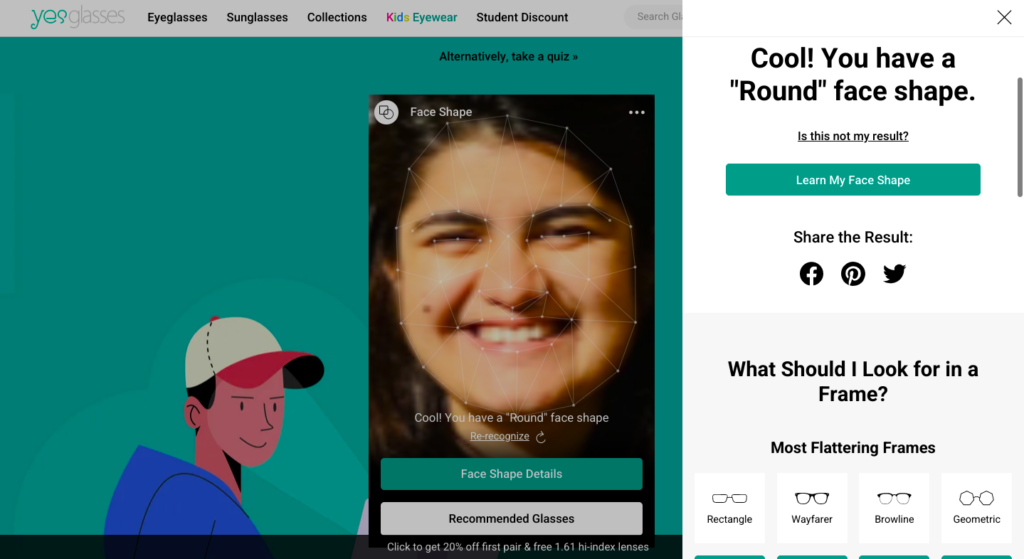
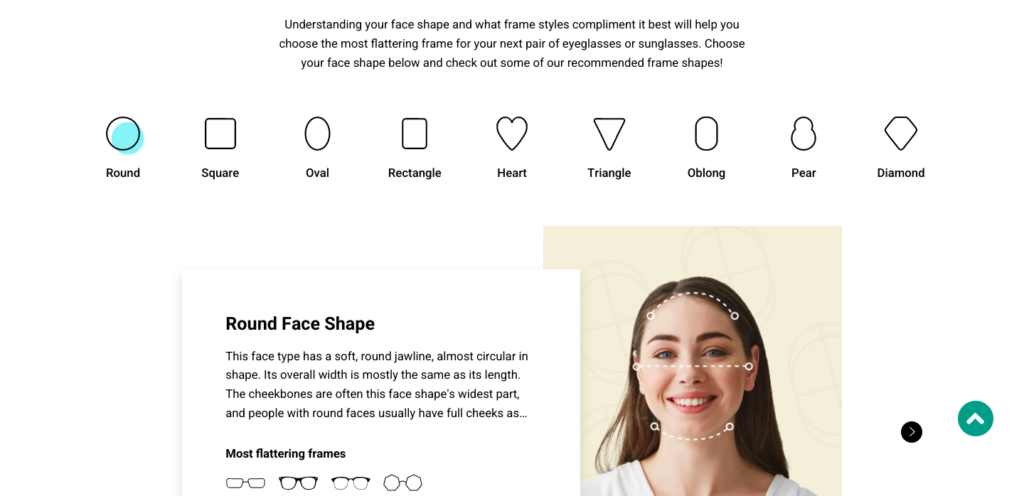
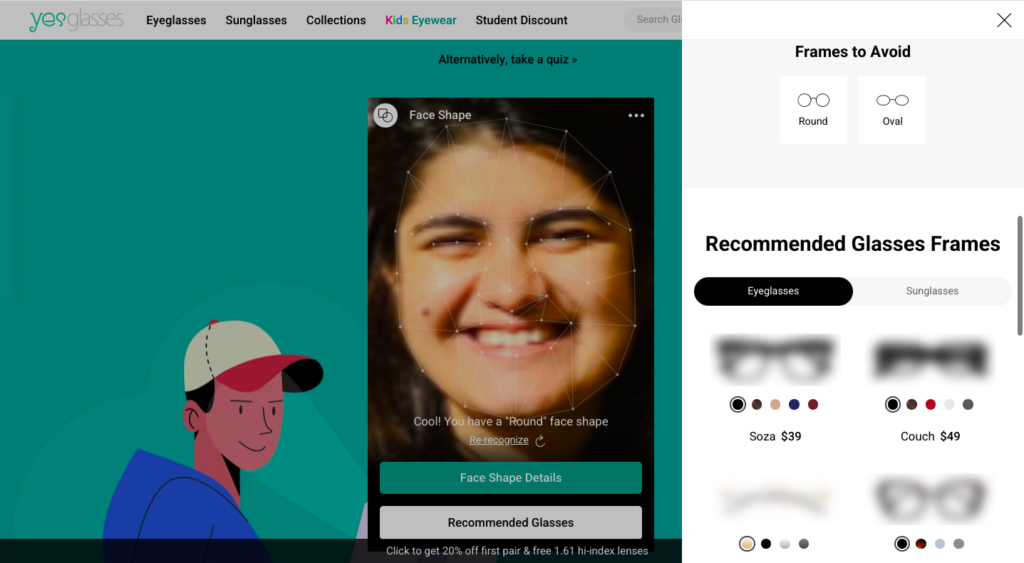
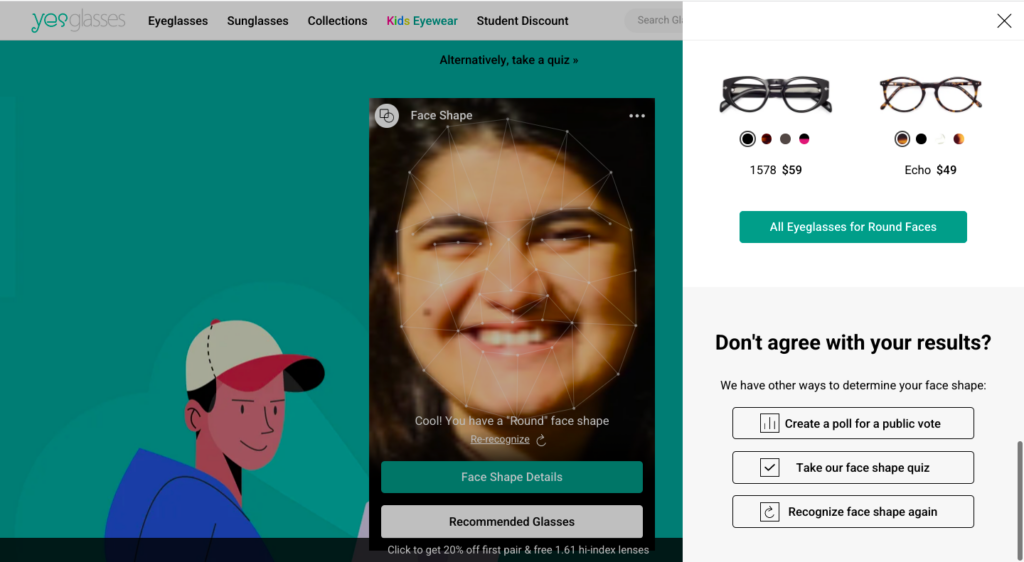
Value Creation
- Customer Centricity: This offering solves a major pain point for a lot of customers – especially those in the younger demographic who are used to the convenience of ordering everything online.For them, this feature is a great way to overcome choice fatigue as well while browsing through a large number of frames. It also pushes the frontier of ‘Try on the Glasses’ – which is a feature that a lot of online sellers have – to go further and meet a pain point even more upstream of deciding what is a good fit based on your face structure. This could lead to greater trust from customers to try a new brand and even come back to it.
- Process Optimization: Yesglasses is competing with a lot of large online retailers offering free delivery and returns services – and providing the same. However, for a smaller company that only exists online, the return costs can be significant in addition to logistics management. By providing glasses that are a good fit for the customer as well as suited to their face, it decreases the likelihood of returns and helps make the end-to-end online operations more optimized.
- Investments and Challenges Overcome: To build such a software that works accurately, the algorithm has to be trained through large and diverse datasets. Given that the website already had the feature of seeing how different frames would look on your face, the software required leveraging that data to identify patterns and train it to recognize face types. A significant challenge, though, is data privacy in this case. In this case, Yesglasses states on its website: “Yesglasses WILL NOT share any submitted customer data to third parties, and any information we receive will not be visible to the public. Your data will only be used to help optimize our recognition system to improve the accuracy of future measurements. You can also request to have your submitted information to be erased permanently from our system.”
Ways of Capturing Value
- Drive greater customer traffic for the business;
- Drive greater customer satisfaction;
- Reduce return costs and logistics since the company offers free returns; and
- Generate new revenue streams through licensing its software for other optical companies OR other industries like makeup, skincare, hair products, etc.
Moving Forward: Challenges and Opportunities
Yesglasses is still a small player in the eyeglasses market – nowhere close to the top 15. Being one of the leads of innovation and experimentation in the space though could potentially lead to imitation from competitors – who also have much more user traffic (if online) and resources to generate in even finer facial recognition software. Further, as is the problem in most companies leveraging facial recognition software, there are issues of bias – which can only be overcome if the company has access to a large, growing, and diverse base of users sharing facial data. Thus, to complement this offering, it also needs to drive greater traffic to its website to see significant financial value. An opportunity in this space though could be licensing its facial recognition software to offline eyeglass retailers for a fee. Offline eyeglass retailers could use the proprietary software to offer a complementary service in their own shops as customers visit to be fitted for eyeglasses.



Great post! This is the first time I’m hearing about this company. While I dont wear glasses myself, I can see how this company is a disruptor to the $13B US market – wow. Unlike most of the other companies that we encounter these days, I like that they’re also thinking about the consumer’s privacy and putting them first.
Great post, Snigdha!
This is actually just the company that I was looking for. I have to go through a lot of trial and error to get certain fashion accessories right.
Interestingly, in the value creation part, yesglasses are clearly a very customer centric company, and yet it sounds like they do not allow returns. I wonder where do they draw the line on being customer centric? I always notice this with a lot of companies, and I would love to be a fly on the wall when contradictory tradeoffs are made for customer centric decisions.